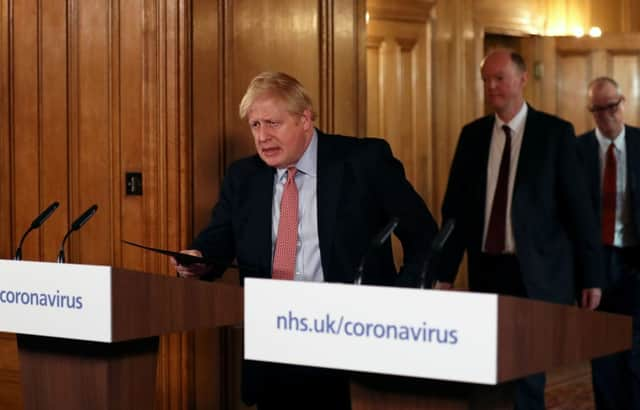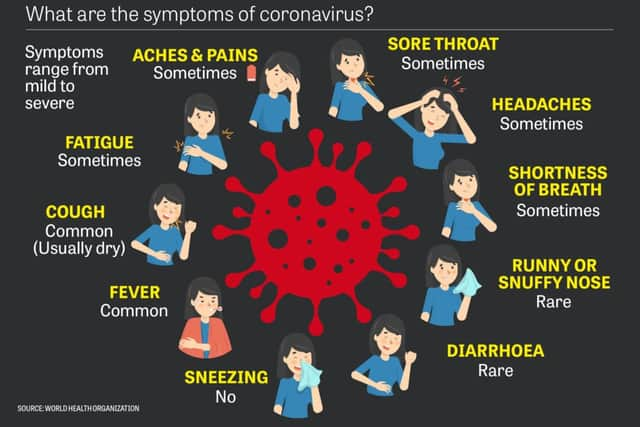Downing Street will give daily televised briefings during the coronavirus outbreak


As the coronavirus outbreak continues across the UK, Downing Street has announced daily briefings to keep the country informed during the crisis.
From Monday 16 March 2020, Prime Minister Boris Johnson or a senior minister will attend a daily televised press conference.
Advertisement
Hide AdAdvertisement
Hide AdThe PM and minister will address the media to keep the nation abreast of any developments and inform them how best to protect themselves from the virus. The move follows criticism from some over the government's apparent lack of transparency over their plans to slow the spread of the virus, which has already claimed lives in the UK.


What will happen during the briefing?
Monday's briefing will follow another emergency Cobra (Cabinet Office Briefing Rooms) meeting chaired by the PM. It's expected that this meeting will focus on plans to shield vulnerable and elderly citizens as well as household isolation and mass gatherings.
Health Secretary, Matt Hancock, has suggested that Monday's Cobra meeting could see mass gatherings banned in an attempt to slow the spread of coronavirus.
He also said that other severe measures could be enforced - including handing police powers to arrest those infected who are not self-isolating.
Advertisement
Hide AdAdvertisement
Hide AdTransport Secretary, Grant Shapps, has already confirmed that the UK's over-70s (who are at heightened risk from the virus) will soon be asked to stay at home for an extended period of time to protect themselves.
He told BBC Radio 4's Today programme that this isolation would still allow over 70s to go outside, provided they did not mix closely with other people.
"It's about being sensible but not mixing in crowds," Mr Shapps said.
Monday's government briefing will see the PM speak alongside Prof Chris Whitty, the UK's chief medical adviser, and chief scientific adviser Sir Patrick Vallance.
Advertisement
Hide AdAdvertisement
Hide AdEach subsequent briefing will be held by the PM or a senior minister, supported by experts. The media will be invited to ask questions about the ongoing situation.
Coronavirus: the facts
What is coronavirus?
COVID-19 is a respiratory illness that can affect lungs and airways. It is caused by a virus called coronavirus.
What caused coronavirus?
The outbreak started in Wuhan in China in December 2019 and it is thought that the virus, like others of its kind, has come from animals.
How is it spread?
As this is such a new illness, experts still aren’t sure how it is spread. But.similar viruses are spread in cough droplets. Therefore covering your nose and mouth when sneezing and coughing, and disposing of used tissues straight away is advised. Viruses like coronavirus cannot live outside the body for very long.
What are the symptoms?
Advertisement
Hide AdAdvertisement
Hide AdThe NHS states that the symptoms are: a dry cough, high temperature and shortness of breath - but these symptoms do not necessarily mean you have the illness. Look out for flu-like symptoms, such as aches and pains, nasal congestion, runny nose and a sore throat. It’s important to remember that some people may become infected but won’t develop any symptoms or feel unwell.
What precautions can be taken?
Washing your hands with soap and water thoroughly. The NHS also advises to cover your mouth and nose with a tissue or your sleeve (not your hands) when you cough or sneeze; put used tissues in the bin immediately and try to avoid close contact with people who are unwell. Also avoiding touching eyes, nose and mouth unless your hands are clean.
Government advice
As of the 12 March the Government has moved into the "delay" phase of its plan to tackle coronavirus. Advice is that anyone with a continuous cough or high temperature should self-isolate for seven days. People over 70 have been advised not to go on cruises and schools advised to cancel trips abroad, though schools remain open.
Should I avoid public places?
Most people who feel well can continue to go to work, school and public places and should only stay at home and self isolate if advised by a medical professional or the coronavirus service.
What should I do if I feel unwell?
Advertisement
Hide AdAdvertisement
Hide AdDon’t go to your GP but instead call NHS 111 or look online at the coronavirus service that can tell you if you need medical help and what to do next.
When to call NHS 111
NHS 111 should be used if you feel unwell with coronavirus symptoms, have been in a country with a high risk of coronavirus in the last 14 days or if you have been in close contact with someone with the virus.
Sources: World Health Organisation and NHS